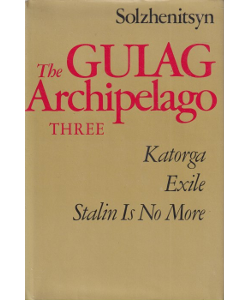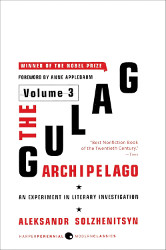The Gulag Archipelago: 1918-1956 (Volume 3)

Author:
Aleksandr I. Solzhenitsyn
Original language:
Russian
Translator:
Thomas P. Whitney
Publication:
1978 by Harper & Row Publishers, Inc
Genre:
History, Memoir, Non-fiction
Series:
The Gulag Archipelago Trilogy ![]() Members Only
Members Only
Series Number: 3
Pages:
558
Current state:
This book has been evaluated and information added. It has not been read and content considerations may not be complete.
Book Guide
"To those readers who have found the moral strength to overcome the darkness and suffering of the first two volumes, the third volume will disclose a space of freedom and struggle. The secret of this struggle is kept by the Soviet regime even more zealously than that of the torments and annihilation it inflicted upon millions of its victims. More than anything else, the Communist regime fears the revelation of the fight which is conducted against it with a spiritual force unheard of and unknown to many countries in many periods of their history. The fighters' spiritual strength rises to the greatest height and to a supreme degree of tension when their situation is most helpless and the state system most ruthlessly destructive."—from the Preface
In this new and final volume of a towering work that is both literary masterpiece and living memorial to the untold millions of Soviet martyrs, Solzhenitsyn's epic narrative moves to its astounding and unforeseen climax. We now see that this great cathedral of a book not only commemorates those massed victims but celebrates the unquenched spirit of resistance which flickered and then burst into flame even in Stalin's "special camps".
The special camps for political prisoners in the last years of Stalin's regime and in those of his heirs were run with a sadistic brutality identical with what we know of Buchenwald and Ravensbruck. There had always been individual escapes and attempted escapes from these camps, and there had been rebellions and strikes in several, but the disciplined, sustained resistance of Kengir, which is described here, involved more than a thousand men, who, in 1954, paralyzed their camp in the middle of Kazakhstan for forty days.
The intoxication of their resistance lends an often joyous note to these pages. However, the exhilaration of heroism must give way to a somber threnody for the fifteen million peasants exterminated during the forced collectivization of farms and for entire nations, like the Volga Germans and Crimean Tatars, exiled to remote territories ... where they remain. Solzhenitsyn also reviews for us the experience of internal exile for those, like himself, who had been released from the labor camps but not from surveillance.
Of the Archipelago as a whole, Le Monde has said: "It is the epic of our times. An epic is always the creation of an entire people, written by the one person who has the creative power and the genius to become the spokesman for his nation. And in this work, we hear a people speaking through the impassioned, intrepid, ironic, furious, lyrical, brutal, and often tender voice of the narrator."
From the dust jacket
To view an example page please sign in.
Please sign in for audiobook information.

![]()
The Gulag Archipelago: Volume 3 ![]()
Reprinted in 2007 by Harper Perennial
Available formats: Paperback
View on Amazon
View on Bookshop.org

![]()
The Gulag Archipelago: Abridged (Authorized by Author) ![]() Abridged
Abridged
Reprinted in 2007 by Harper Perennial
Available formats: Paperback
View on Amazon
View on Bookshop.org
View Ebook on Amazon
View Audiobook on Amazon
The official, one-volume edition, authorized by Solzhenitsyn.
Please sign in for additional information about this book.



